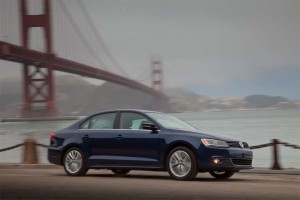Already having passed its Japanese rival on the bottom line, Volkswagen is taking aim at Toyota’s other crown, hoping to soon surpass it as the world’s best-selling automaker.
The German maker is rapidly moving to shore up global weak spots – like the United States – while pushing for fast growth in key emerging markets, such as China, where it maintains a modest lead over the former king-of-the-global-hill General Motors.
For many industry leaders, it’s more a question of when, rather than whether, VW will firmly land as global sales leader.
The maker’s CEO Martin Winterkorn is certainly among those who believe it will happen, telling Bloomberg News, “The Volkswagen Group continues to have its sights firmly set on capturing pole position in the automotive industry.”
The maker is moving ahead with a 10-year plan, which began in 2008, calling for global domination. But it has already achieved some of its goal for leadership, notably on the bottom line. For the first nine months of 2010, VW profits quintupled, to $5.23 billion.
Wounded by its ongoing safety problems – which have led to the worldwide recall of more than 11 million vehicles so far this year, Toyota is struggling to maintain its once-vaunted profit margins. For the full fiscal year, which wraps up on March 30th, 2011, it forecasts profits of $4.16 billion, or 20% short of VW’s earnings.
Toyota still holds the sales leadership, however. VW sales are on target to approach 7 million for all of 2010, exceeding the previous record, set only last year, when it hit sales of 6.29 million. Using an apples-to-oranges calendar, Toyota is still solidly in the lead, with sales for the current fiscal year forecast to reach 7.38 million. That’s a modest jump from the 2009 fiscal year’s 7.24 million.
But more worrisome for the Japanese giant, it has had to retrench sharply, the weak global economy complicating its recall problems. Toyota had originally forecast a massive sales jump for 2010, and if it had hit target it would have been the first automaker ever to reach the 10 million mark in a single year.
The question is just how long Toyota’s problems will continue – and how severe the damage to its image. Last month, during an appearance in Detroit, Don Esmond, Toyota’s second-ranking American, insisted the maker’s safety problems were “behind us.” But only days later it announced another recall, this one involving 1.5 million vehicles worldwide, half in the U.S.
“It’s another black eye,” warned analyst Joe Phillippi, of AutoTrends Consulting.
If the goal is simply toppling Toyota, there are reasons to take VW CEO Winterkorn seriously when he aims for “pole position.” But while he insists the German giant is “well-positioned to achieve the goals laid down” in its 10-year plan, VW has plenty of obstacles of its own to overcome.
The U.S. is one of the speed bumps on that path. Combining both the VW and Audi brands, the maker, this year, still will barely reach two-thirds of the volume that the Volkswagen brand alone hit in 1970, when it set an all-time record of 569,696.
Back then, VW was the dominant import, with models like the original Beetle and the hippie-era Microbus. But Detroit wasn’t the only one to feel the brunt of the Japanese assault following the twin oil shocks of the 1970s. And whether one blames the German maker’s inability to resolve nagging quality issues or its reluctance to deliver products specifically targeted to U.S. buyers, volumes have never fully recovered.
With the launch of the new 2011 Jetta, the upcoming opening of a new assembly plant in Chattanooga, and the planned introduction of a new midsize sedan developed specifically for the U.S. market, VW aims to reverse its decades-long fall from grace.
More importantly, many analysts argue, is it performance in emerging markets, like China. There VW is in a pitched battle with General Motors. But perhaps the bigger question, analysts like Phillippi ask, is how VW will fare, longer-term, against ambitious domestic brands, such as Geely and even its joint venture partner, SAIC, which wants to expand sales under its own brand name.
In the home European market, long-time laggard Audi is now running ahead of the more established BMW and Mercedes-Benz. But while products like the VW Golf and Jetta are still forces to be reckoned with in the mainstream market, the Germans do have some problems at hand, notably the struggling Seat brand. There’s ongoing speculation, in both the business and automotive press, over whether the maker will ultimately have to abandon the Spanish-based brand.
But while VW does have problems to deal with, the maker continues to gain momentum and ride over most of the speed bumps ahead. With it now knocking Toyota off its profit perch Winterkorn may be right, and the question is more a matter of when VW will also land at pole position in the sales race.

